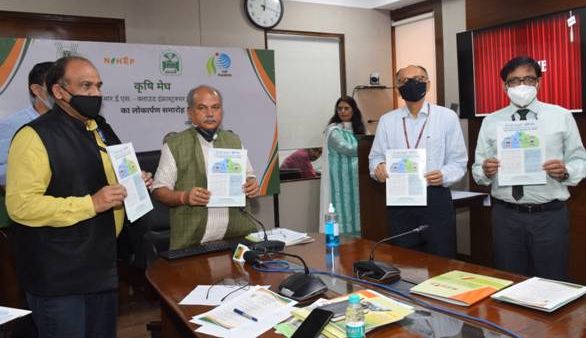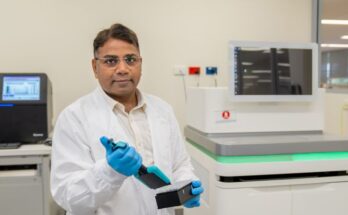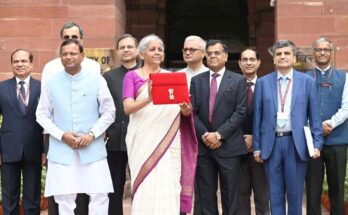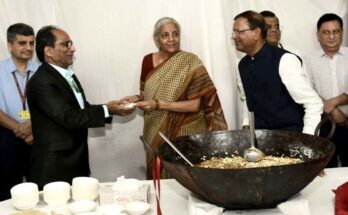Union Minister of Agriculture & Farmers’ Welfare, Narendra Singh Tomar today virtually launched the Krishi Megh (National Agricultural Research & Education System -Cloud Infrastructure and Services) along with the KVC ALUNET (Krishi Vishwavidyalaya Chhatr Alumni Network) and Online Accreditation System for Higher Agricultural Educational Institutions (HEI).
The minister emphasised that the Government of India-World Bank funded National Agricultural Higher Education Project is designed for strengthening the national agricultural education system in the country with the overall objective to provide more relevant and high-quality education to the agricultural university students that is in tune with the New Education Policy – 2020. Tomar accentuated the need to save and preserve the important research-based data in a prompt digitised form to enable its access anywhere in any corner of the country and the world. He also stressed on enabling private investments in agriculture. The minister regarded the Krishi Megh as a step forward towards digital agriculture of New India.
Speaking on the occasion, Parshottam Rupala, Union Minister of State for Agriculture & Farmers’ Welfare said that 2-3 ICAR institutes should be made research centres of international repute. He also stressed on providing the real-time data to the researchers.
Krishi Megh integrates the ICAR-Data Centre at ICAR-Indian Agricultural Statistics Research Institute, New Delhi with the Disaster Recovery Centre at the ICAR-National Academy of Agricultural Research Management (NAARM), Hyderabad.
Dr. Trilochan Mohapatra, Secretary, Department of Agricultural Research and Education, (DARE) and Director General, Indian Council of Agricultural Research (ICAR) underlined about 58 universities which have been supported in various categories under the ICAR’s National Agricultural Higher Education Project (NAHEP). He highlighted about 377 students (UG, PG and Ph.D.) who have received international training and internships along with the training provided to around 120 faculty members in the various international universities. He also stressed on maximising the use of internet technology and digitalisation. Dr. Mohapatra highlighted the main features of the Krishi Megh that is equipped with the latest Artificial Intelligence (AI), deep learning software, toolkits for building and deploying of deep learning based applications through image analysis, disease identification in livestock, among others.
He stressed that the Krishi Megh was a new chapter in digital India enabling the farmers, researchers, students and policy makers more equipped with updated and latest information regarding agriculture, research, education and extension in digital form generated by ICAR institutes and state agriculture universities (SAUs).
Earlier, in his welcome address, Dr. RC Agrawal, Deputy Director General (Agricultural Education), ICAR briefed about the main objective of the programme. He highlighted the development of the KVC ALUNET that has been a result of an idea of social networking for the alumnus of the agricultural universities. He stressed that this should enable the alumni of all the 74 agricultural universities in connecting with each other and making it possible to assist the students in internship, placements and to provide support to their alma maters.
Edward William Bresnyan, Task Team Leader, World Bank regarded the ICAR’s initiative as a game changer that will bring a major transformation in the agricultural education system. The senior officials of ICAR and its institutes also virtually participated in the programme.
Salient Features of Krishi Megh
- For meeting the services and infrastructure needs of digital agriculture of National Agricultural Research and Education System (NARES). The existing Data Centre (ICAR-DC) built during 2012 shall be strengthened with cloud computing infrastructure.
- NARES-Cloud Infrastructure and Services with its constituents ICAR-DC and ICAR-Krish Megh provide a robust and dynamic platform to meet the growing IT needs of the NARES system with the deployment of mission critical applications such as e-Office, ICAR-ERP, Education Portal, KVK Portal and mobile apps, ICAR institute websites, Academic Management System, Alumni Portal, e-Courses of UG and PG level.
- Under NAHEP, the outreach of existing ICAR Data Centre is broadened to cover the agriculture universities enabling them to host their websites and IT solutions.
- In the present COVID-19 situation, 24×7 availability of IT applications through have made it possible to work from home as well as to collaborate with fellow scientists through video conferencing.
- ICAR-Krishi Megh at NAARM Hyderabad is synchronised with ICAR-Data Centre at ICAR-IASRI, New Delhi has been built to mitigate the risk, enhance the quality, availability and accessibility of e-governance, research, extension and education in the field of agriculture in India.
- NAARM, Hyderabad has been chosen as it lies in different seismic zone w.r.t. ICAR-Data Centre at ICAR-IASRI, New Delhi. Hyderabad is also suitable as skilled IT manpower is available along with other suitable climatic conditions such as low humidity level which is controllable at the Data Centre environment.
- This new Centre has latest AI, deep learning software, toolkits for building and deploying of deep learning based applications such as disease and pest identification using image analysis, detection of maturity and ripening of fruits through image analysis, disease identification in livestock among others.





Thanks to your article, I really appreciate the chance of allowing me to discuss this topic “Education”. According to the Constitution of the Republic of Turkey, every citizen has the right to education which is free of charge for the compulsory primary education. No one shall be deprived of the right of education. The scope of the right to education shall be defined and regulated by law. … The freedom of education does not relieve the individual from loyalty to the Constitution.